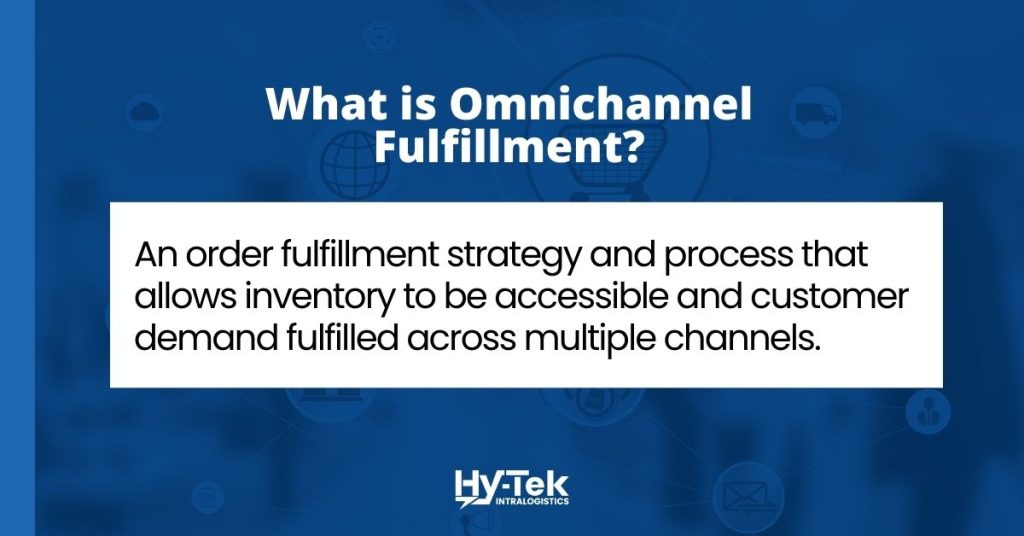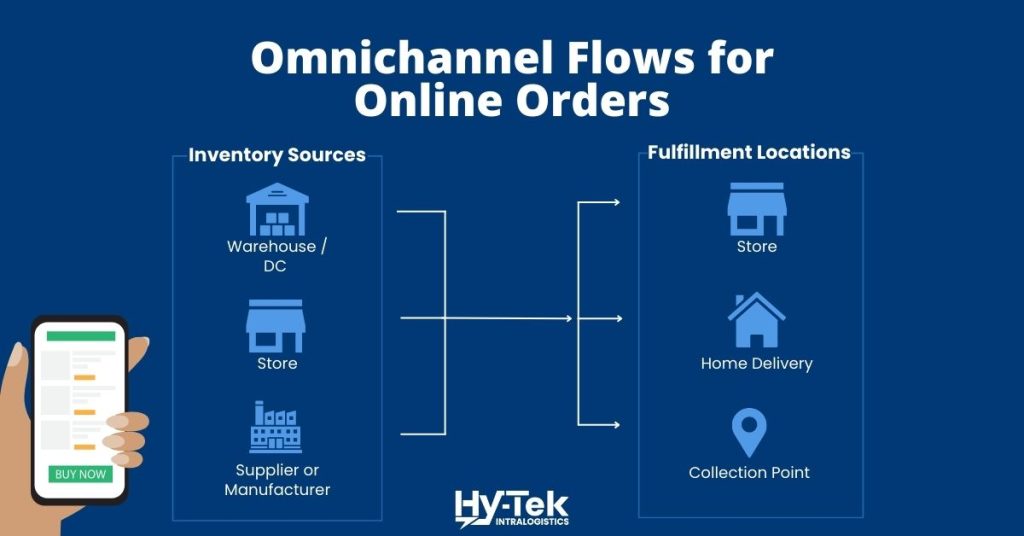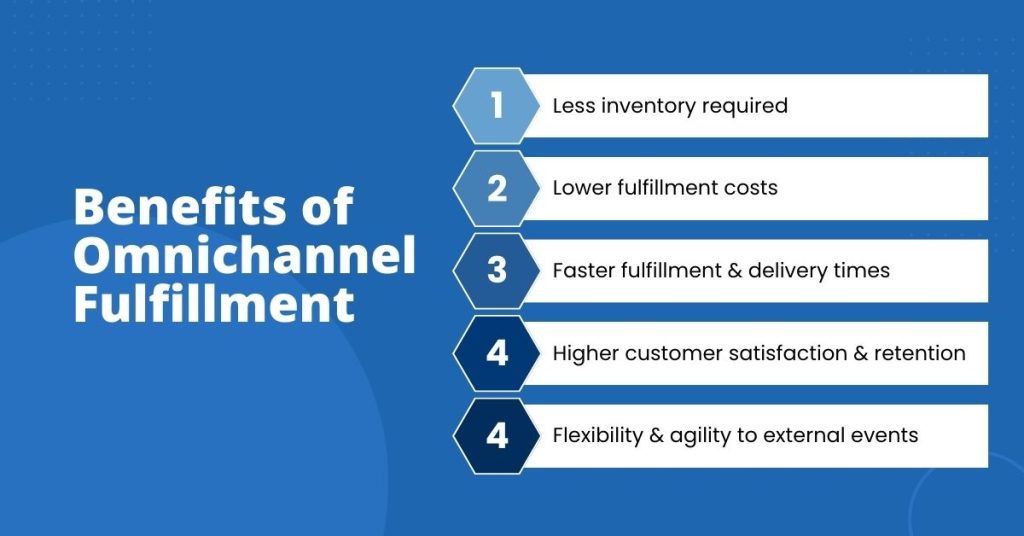In today’s rapidly evolving and intensely competitive market, the success of any business hinges on its ability to adapt, diversify, and meet the ever-changing demands of its customers. Enter omnichannel fulfillment – a transformative approach that is no longer just a buzzword but an imperative strategy for businesses striving to thrive in this dynamic landscape.
In a recent study, 87% of retail respondents said they recognize the importance and value of omnichannel fulfillment, so let’s dive into what all the fuss is about.
- What is omnichannel fulfillment?
- Examples of Omnichannel fulfillment
- How omnichannel fulfillment works
- 5 advantages of omnichannel fulfillment
- FAQs about omnichannel fulfillment
What is omnichannel fulfillment?
Omnichannel Fulfillment is an order fulfillment strategy and process that allows all inventory to be accessible and customer demand fulfilled across multiple channels.

In other words, an Omnichannel strategy allows orders to be fulfilled via a multitude of channels potentially from a multitude of locations.
Examples of Omnichannel Fulfillment
The following list provides several examples of how a retailer uses multiple channels to fulfill customer orders:
- Customer Orders Online / Order Delivered Directly to Customer from Warehouse
- Customer Orders Online / Order Delivered Directly to Customer from Store
- Customer Orders Online / Order Delivered Directly to Customer from Manufacturer
- Customer Orders Online / Customer Picks Up in Store
- Customer Selects Items in Store / Customer Purchases in Store
As shown in the examples above, inventory housed in different location types (Warehouse & Store) is available to fulfill any customer order, either online or in-store purchase.
Additionally, there are different channels available through which the order is fulfilled e.g., direct from the warehouse, direct from store, direct from the manufacturer, pick up in-store, purchase in-store.

How Omnichannel Fulfillment Works
1. Multiple sales channels: The first step in omnichannel fulfillment is to set up and integrate various sales channels. This can include physical stores, e-commerce websites, mobile apps, marketplaces, and more.
2. Centralized inventory management: Maintain a centralized inventory management system that keeps track of all available products across different sales channels. This system should update in real time to ensure accurate stock information.
3. Order processing & routing: A customer can place an order through any sales channel, whether it’s online, in-store, or via a mobile app. This order is recorded in the centralized system. The centralized system routes the order to the most appropriate fulfillment center, which could be a warehouse, store, or distribution center, based on factors like inventory availability, proximity to the customer, and shipping preferences.
4. Order fulfillment: Once the order reaches the designated fulfillment center, employees or automation systems pick the items from the inventory and pack them for shipping. This can happen in a retail store, warehouse, or dedicated distribution center.
5. Shipping & delivery: The fulfillment center selects the shipping and delivery method, which could involve shipping to the customer’s home, shipping to a store for in-store pickup, or other options. The customer may also have the choice to select their preferred delivery method.
- Ship-from-DC/Warehouse
- Ship-from-3PL
- Ship-from-Store
- Ship-to-Store
- Ship-to-Partner
6. Returns & exchange processing: If the customer is unsatisfied with their purchase, the return or exchange process is coordinated through the integrated system. It’s important to optimize the return process so that it is easy and convenient for the customer but also allows you to get the returned items back into available inventory quickly.
Advantages of Omnichannel Fulfillment
Expanding customer outreach is easier for businesses when consumers have the flexibility to choose how they make their purchases across various channels and platforms. In industries marked by fierce competition and a desire to avoid reliance on a single avenue, the concept of omnichannel fulfillment emerges as an astute choice when choosing a retail distribution strategy.
While there are numerous advantages associated with this approach, the primary attractions lie in its capacity to unlock cost-efficiency, elevate customer satisfaction, and make businesses more agile to changing demands.
1. Less inventory
Because inventory can be shared across multiple locations, the amount of overall inventory required is less than if inventory is dedicated by channel.
This allows, for example, a retailer to leverage the inventory previously restricted to stores for in-store purchases to be allocated for online purchases as well. Another advantage is that omnichannel fulfillment also allows a retailer to take advantage of inventory on hand at the manufacturer as well.
2. Lower fulfillment costs
Through Omnichannel Fulfillment a retailer has the ability to fulfill customer orders utilizing the most optimal channel because orders can be fulfilled from the optimal inventory location regarding both fulfillment cost and lead time.

3. Faster fulfillment times
Because orders are likely fulfilled by stores or distribution centers that are located within miles of the customer’s shipping address, orders can be delivered much faster than if they have to travel across many states.
4. Higher customer satisfaction & retention
With lower fulfillment costs and faster delivery times, customer satisfaction is likely to be higher, and therefore, so is customer retention.
5. Fulfillment flexibility & agility
Since there are multiple ways to fulfill an order, customer satisfaction can be maintained during external events impacting one part of the fulfillment network such as a winter storm or natural disaster in the proximity of a warehouse or group of stores.
Omnichannel fulfillment offers significant advantages through both improved customer satisfaction and decreased operational costs. However, implementing an Omnichannel fulfillment strategy requires investment in order management and warehouse management systems (WMS). These systems are needed to provide the structure necessary to correctly route and fulfill customer demand. Through both investment and commitment, Omnichannel Fulfillment can be embraced and deliver significant returns to any retailer.
FAQs about Omnichannel Fulfillment
How Can I Implement Omnichannel Fulfillment in My Small Retail Business?
Evaluate Your Existing Sales Channels: Assess your existing sales outlets, including physical stores, e-commerce platforms, and social media, understanding their strengths and weaknesses.
Centralize Inventory: Invest in inventory management for real-time stock tracking across all channels, ensuring accurate inventory data.
Choose Tech Solutions: Select suitable technology, like order management (OMS) and customer relationship management (CRM) software, to integrate and manage customer data and orders.
Unified Customer Data: Ensure consistent storage of customer information, including profiles, purchase history, and preferences, for a seamless customer experience.
Consistent Branding: Implement uniform branding and pricing strategies across all channels to create a cohesive shopping experience.
Optimize Shipping and Returns: Develop flexible shipping and returns options catering to customer preferences, such as home delivery and in-store pickup.
Team Training: Provide staff training on the significance of omnichannel fulfillment for business growth and customer satisfaction.
Pilot Programs: Run test programs, gathering feedback from customers and staff to make necessary adjustments.
Data Analysis: Continuously monitor omnichannel performance, paying attention to customer feedback and sales patterns.
Adapt and Expand: Adjust your strategy to changing market dynamics and consider expanding to new channels aligned with your business goals.
What Are the Most Common Challenges Retailers Face When Implementing Omnichannel Fulfillment?
Inventory Management and Accuracy: Coordinating inventory across various sales channels and ensuring real-time accuracy can be a complex task. Retailers must manage stock levels effectively to prevent overstocking or stockouts. A centralized inventory system is critical, but technical issues, data discrepancies, and synchronization problems can lead to inventory errors.
Technology Integration: Integrating the necessary technology, such as order management systems (OMS), customer relationship management (CRM) software, and e-commerce platforms, can be challenging. It requires substantial investments and expertise to ensure these systems work seamlessly together. Compatibility issues, software updates, and data security concerns can complicate the integration process, however, a software assessment consultant and integration specialist can help.
Supply Chain Complexity: If a business operates in a complex supply chain environment with multiple distribution centers, stores, and third-party partners, it must coordinate these elements efficiently. The more intricate the supply chain, the more challenging it can be to synchronize operations while minimizing costs.
How Do You Handle Returns in an Omnichannel Fulfillment System?
In an omnichannel fulfillment strategy, you can offer either cross-channel or same-channel returns. Cross-channel means you can return the items in a different method than you purchased, whereas same-channel means the items are returned the same way you purchased them. An example of cross-channel returns would be when a customer orders an item online and then returns it to a store. In a recent study, it was found that cross-channel return strategies always result in more revenue for omnichannel retailers compared to same-channel return strategies. It was also found that consumers are more sensitive to liberal return fee strategies than offering multiple return channels.
What Technology or Software Solutions Can Aid in Implementing Omnichannel Fulfillment?
– Order management system (OMS)
– Warehouse management system (WMS)
– Customer relationship management system (CRM)
Contact a consultant today to jumpstart your supply chain strategy!





